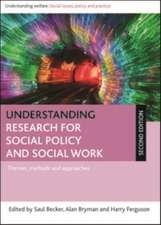Participatory Research: Working with Vulnerable Groups in Research and Practice
Autor Jo Aldridgeen Limba Engleză Paperback – 16 aug 2016
Drawing on in-depth case studies, this book examines the nature of participatory research in the social sciences and its role in increasing research participation among vulnerable or marginalized populations. In so doing, Participatory Research details how inclusion and collaboration can be enhanced among vulnerable research participants—such as those with profound learning difficulties, victims of abuse and trauma, and children and young people—and shows how useful the approach can be with these groups. Also exploring important ethical issues and challenges associated with participatory research, this book will be an invaluable resource for an international audience of students, researchers, and academics seeking to put participatory research methods into practice.
| Toate formatele și edițiile | Preț | Express |
|---|---|---|
| Paperback (1) | 362.81 lei 6-8 săpt. | |
| Bristol University Press – 16 aug 2016 | 362.81 lei 6-8 săpt. | |
| Hardback (1) | 774.26 lei 6-8 săpt. | |
| Bristol University Press – 10 feb 2015 | 774.26 lei 6-8 săpt. |
Preț: 362.81 lei
Nou
Puncte Express: 544
Preț estimativ în valută:
69.43€ • 71.88$ • 58.69£
69.43€ • 71.88$ • 58.69£
Carte tipărită la comandă
Livrare economică 06-20 martie
Preluare comenzi: 021 569.72.76
Specificații
ISBN-13: 9781447325550
ISBN-10: 1447325559
Pagini: 200
Ilustrații: 4 line drawings
Dimensiuni: 159 x 235 x 13 mm
Greutate: 0.34 kg
Editura: Bristol University Press
Colecția Policy Press
ISBN-10: 1447325559
Pagini: 200
Ilustrații: 4 line drawings
Dimensiuni: 159 x 235 x 13 mm
Greutate: 0.34 kg
Editura: Bristol University Press
Colecția Policy Press
Notă biografică
Jo Aldridge is professor of social policy and criminology and director of the Young Carers Research Group at Loughborough University, UK. She is a coauthor of Children Caring for Parents with Mental Illness: Perspectives of Young Carers, Parents and Professionals, Growing Together: A Practice Guide to Promoting Social Inclusion through Gardening and Horticulture, and Health, Well-Being and Social Inclusion: Therapeutic Horticulture in the UK, all also published by Policy Press.
Cuprins
Introduction
Participation, ‘vulnerability’ and voice
Participatory research with children and young people
Involving people with learning difficulties in participatory research
Participatory research with victims of abuse and trauma –
Women victims-survivors of domestic violence
Participatory research: interpretation, representation and transformation
Advancing participatory research
Participation, ‘vulnerability’ and voice
Participatory research with children and young people
Involving people with learning difficulties in participatory research
Participatory research with victims of abuse and trauma –
Women victims-survivors of domestic violence
Participatory research: interpretation, representation and transformation
Advancing participatory research
Recenzii
“An invaluable resource for researchers and health and social care practitioners. Jo Aldridge distils her extensive experience of working in participatory ways with ‘vulnerable’ groups into a fascinating and accessible volume, using a range of case studies to offer detailed insights into innovative methods that can enhance autonomy, control, and emancipation.”
“A thoughtful, clearly written book which makes a valuable contribution to knowledge about participatory research with marginalized groups of people. Of particular interest is the application of creative narrative approaches to researching with diverse groups.”
“Aldridge’s pioneering participatory work with young carers, individuals with learning disabilities, and women survivors of domestic abuse is presented in a coherent and useful way; not shying away from the barriers to working with these groups, both practically and ethically. Through these case studies, Aldridge takes the reader through participatory research; from passive to truly transformative participation. By proffering a model of participation alongside the case studies, she allows the reader to review where the studies described in the book sit within this model. Aldridge also offers the model as a tool to encourage readers to critically appraise their own research and that of others.. . . . Clearly written, interesting and thought-provoking, I would recommend this book to anyone working with, or wanting to work with, vulnerable groups to ensure their ‘voice’ is projected into the research world and society in general.”















